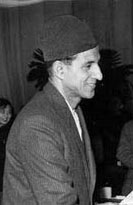Jail Journal
Jail Diary of BP Koirala
Explanatory notes in parenthesis are given to help readers locate the characters in BP Koirala's personal and political life - Editor.January 1, 1967:
Made the usual New Year's Day Resolve - drew a programme of work to be accomplished during the year. This year will also be the seventh year of my imprisonment. Want to make the year most productive. I have also drawn up a long list of books to read and to write. My health is on the whole good; there is no reason why I cannot work hard and particularly that is what I have resolved to do if my resolution endures.January 2, 1967:
Thought of Prakash (Prakash Koirala, eldest son of BP Koirala) who has not been doing well in his studies. He is a very sensitive boy and has the makings of a leader. If he does not succeed in his studies, he will be thoroughly demoralized. I understand his difficulties, because I too had encountered them when I was a student. If I had been out, I would have been a great help to him. He is paying the price for my idealism - perhaps the pursuit of idealism entails a lot of sacrifice on the part of those who happen to be dependent on an idealist (who has, of course, made sacrifice himself ).January 3, 1967:
In my opinion at the centre of man's problem is the problem of his freedom. He is born unfree, his lifelong striving is to be free. Human activities - philosophical and artistic, political and economic, social and scientific - are his strivings in the quest of his freedom. I am deeply dissatisfied with the current spate of books which seem to forget this central problem (human) of freedom; that is why they appear so superficial to me. Modern man's - young men's - superficiality, his hollow activities (because they are not striving, but are a mere purposeless motion), his lack of idealism, are all due to his lack of interest in this central question. The great crime that is committed against man is the denial of freedom to him. Those scientists (sociologists) who treat human beings as a species of animals are abettor of this crime.January 6, 1967:
Dr. Raj Bhandari examined me and found me ok. He cannot explain why I get occasional pain in my throat and nose. The doctor has advised me to give up morning walk. Perhaps he thinks the cold has affected my throat. I have no intention of giving up my morning walk. It gives me pleasure to expose my face to the cold draught of the morning and to walk crunching over the frost hardened ground. I derive a sense of well-being also a sense of adventure, too.
Talking of pleasures, I find them more in little things and petty sensations than in big ones. Sex is too over pressing to be savoured as pleasure. Sands, as they yield under pressure gicle the soles of my feet playfully - like some beloved. I like to rest in a tub of hot water; the drowsiness thus infused is akin to pleasure; to sleep over a clean bed; to feel beloved's breath somewhere on my body, warm and wet; fragments of music which tentatively floats and then disappears in the air. Sushila says that the greatest pleasure is just to watch children - how they behave like children, how they walk, how they lisp, how they spiel or giggle, how they sleep, how they play. She says that children do not over behave; they always play - even in anger and sleep.
I read Mohan Rakesh's "Bandh Andhere Kamare." Language is on the whole good, but at places it takes on poetic quality which is most unsuited to the tempo of the novel. Rakesh is a poet also perhaps - the poet in him intrudes into his style and the language (which is out of place in a novel of this kind).
What does the writer want to say - the story and the relationship of Harbans and Nilima? He takes us with them to all places, to all kinds of situations without telling us what the matter really is between them that prevents the understanding between this couple. Their frustration is not clearly accounted for in the novel.
January 9, 1967:
"Wey Din" by Nirmal Varma: a much talked about novel in Hindi. I however found it extremely disappointing. Pale imitation of Hemingway (Hemingway's The Sun Also Rises) - attempts at drawing picture of postwar atmosphere of frustration in Europe. There is not much of a story and the frustration that the writer wants to evoke is causeless, because the writer has not shown why there should be frustration in the life of the girl from Vienna - too many signs and cryptic philosophical utterances do not constitute the cause of misery or frustration - hence the story being a picture of unexplained unhappiness leaves the reader cold. I did not like the prolific use of English words in the novel; it is a trick used in place of profundity to serve the purpose of profundity. The writer has proved that he has lived long years in Prague and knows the city and its sights, particularly its bars and dancing floors - but he has overdone it when he starts writing about which street he went by or which bar he visited. We are not interested in the proper names of the streets and the city's other locations - they are not necessary for the story. I also did not like his style of writing - slipped sentences with too many dashes.

